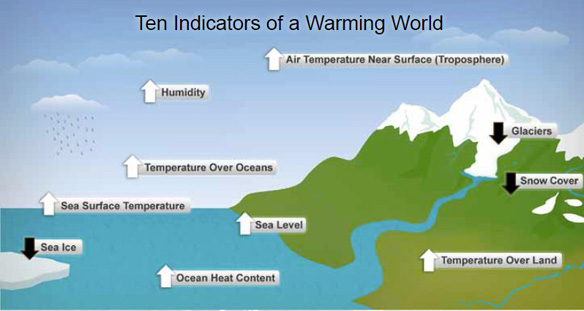Global warming signs unmistakable: report
Last Updated: Thursday, July 29, 2010 | 5:52 PM ET
CBC News
A new report by 300 scientists has flagged the past decade as the hottest on record and compiled 10 "unmistakable" indicators that the world is getting warmer.
But the scientists mostly stayed away from discussions about the cause.
The 2009 State of the Climate report released Wednesday by the U.S. National Oceanic and Atmospheric Administration combines data on temperatures, humidity, sea levels, sea ice, glaciers and spring snow cover going back to 1940 or 1850, depending on the type of data.
"When we follow decade-to-decade trends using multiple data sets and independent analyses from around the world, we see clear and unmistakable signs of a warming world," said Peter Stott, one of the report's 300 contributors, in a statement.
Stott is head of Climate Monitoring and Attribution for the Met Office Hadley Centre in the U.K., one 160 research groups in 48 countries, including Canada, that contributed to the report. CBC News was unable to reach any of the Canadian co-authors.
The report, published annually in the Bulletin of the American Meteorological Society since 1990, does not include climate model projections.
Individual chapters of the report mention that human emissions of carbon dioxide have been linked to climate change. They also describe some changes, such as the increase in heat in the ocean, as consistent with our understanding of how humans are likely contributing to climate change. However, the report does not give an overall statement about the cause of the warming or what should be done about it.
Many previous large compilations of data by large groups of scientists such as the United National Intergovernmental Panel on Climate Change, have said human activities such as the burning of fossil fuels are "very likely" the cause of climate change and have pushed policy makers to act.
Meanwhile, opponents of agreements and policies to reduce carbon emissions, including a handful of scientists, have argued there could be a natural cause for global warming.
Among them is Ian Clark, a geography professor at the University of Ottawa who researches Arctic permafrost. He thinks the reason the climate report doesn't deal much with the cause of global warming is because "nobody really knows the cause."
Clark, who has been scientific adviser to a group opposed to the Kyoto Protocol called the Natural Resources Stewardship Project, is among those who think global warming may be due to variations in solar energy hitting the Earth.
In recent years, published evidence has suggested that the sun's output is not correlated with warming temperatures.
Regardless of such differences in opinion, Clark said there is now widespread scientific agreement that the world is warming. However, he said this is not necessarily a bad thing, since it could lengthen the growing season in countries such as Canada.
P.J. Partington, climate change policy analyst for the environmental think-tank the Pembina Institute, said he thinks the report didn't include discussions about the cause because of its limited scope.
'Just based on direct observations'
"I think the purpose of the report...is a yearly check in on key climate indicators," he said. "It doesn't deal with attribution in the way that a more comprehensive report would. I think it's just based on direct observations rather than speculating."
 Melting glaciers, such as those in Glacier National Park, were among the 10 indicators in the report pointing toward global warming. (Canadian Press)However, he added, he thinks there's pretty strong agreement within the scientific community about the human contribution to global warming, as indicated by other reports.
Melting glaciers, such as those in Glacier National Park, were among the 10 indicators in the report pointing toward global warming. (Canadian Press)However, he added, he thinks there's pretty strong agreement within the scientific community about the human contribution to global warming, as indicated by other reports.
On its own, the new report provides little direction to policy analysts such as himself, he acknowledged. But he said it fits well with other, more comprehensive reports and is useful in the way it combines 10 different climate change indicators.
"It gives us quite a clear picture and that gives us a lot more confidence in projections that are being made," he said.
The new report comes after a year of attacks on the credibility of climate change scientists. In 2009, about 1,000 emails were stolen from the climatic research unit of the University of East Anglia in Norwich, England. Some of them included scathing remarks about their critics and discussions of how to stonewall skeptics of the human role in climate change. The researchers were eventually cleared of dishonesty or corruption by a series of investigations.
However, polls have shown that the public has become less worried about climate change over the past year.
Partington believes the new "clear and accessible report" lays out all the evidence in a way that could address that.
"A lot of the recent controversy has been fuelled by a cynical attempt by some to really overstate the level of uncertainty about certain things," he said.
 The report says various temperature indicators are rising, while snow cover, glaciers and sea ice are declining. (NOAA)
The report says various temperature indicators are rising, while snow cover, glaciers and sea ice are declining. (NOAA)
